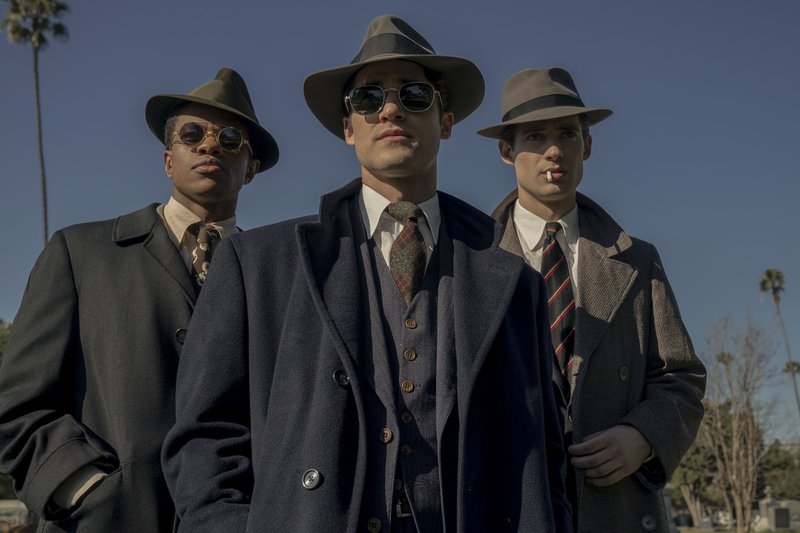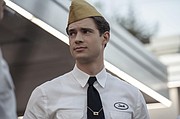Given the century or so that Hollywood spent scrubbing the American experience clean of stories by and about racial, ethnic and sexual minorities -- along with its consistently cruddy and abusive treatment of women -- why not rewrite some of its dearest lore? What's so sacred about silver-screen history that it can't endure a fancy slap of intentional revisionism, in which studios see the light of diversity long before it could be clearly seen?
That's the blunt message of Ryan Murphy's grandiose yet often captivating Netflix drama Hollywood: If the town is built on make-believe and big dreams, then let us now make-believe that a few of its producers, writers and directors somehow became woke 70 years or so ahead of schedule, thus altering the post-war trajectory of cinema's Golden Age.
Hollywood
Episodes streaming
on Netflix
Why not give the dream back to those who never had a chance to win it -- the black screenwriter, the secretly gay heartthrob, the mixed-race director who wants to cast his black girlfriend in a leading role? What if a studio head got an emphatic snap-to on civil rights from none other than Eleanor Roosevelt and started greenlighting pictures that defied conventional wisdom, as well as Jim Crow? Woulda, coulda and definitely shoulda.
Co-created by Murphy and Glee and Scream Queens collaborator Ian Brennan, Hollywood is a pure fantasy writ as large as the iconic hillside sign that serves as this story's big, fat metaphor. About halfway through, it will dawn on a viewer that the most provocative part of Hollywood is not its sauciness; it's that the show fully intends to hand out happy endings the way Oprah used to give away cars.
Hollywood -- which began streaming on Netflix May 1 -- opens with a wide-eyed Midwesterner, Jack Castello (David Corenswet), who returns from the war and moves to L.A. with his dutiful wife, Henrietta (Maude Apatow), hoping to turn his good looks into boffo box-office. First, he must get in line (literally) at the fabled gates of Ace Studios, where a lucky few are picked each day to play extras in movies.
After some setbacks, Jack meets Ernie West (Dylan McDermott), who hires him to pump gas at his popular filling station, where Jack soon learns that when customers pull up and ask to go to Dreamland, that's the attendant's cue to hop in the car and go have sex with them -- splitting a top-dollar fee with Ernie.
Hollywood has an unsuccessfully nuanced degree of ambivalence about Ernie's operation, in which sex work is portrayed as a means to an end, and which the series all but rousingly endorses -- while at the same time deploring the old ways of perverted agents, casting-couch ogres and gruelingly strict beauty standards.
The show's plot hardly leaves time to sort through these moral ambiguities, as the characters begin to intersect and compare their common goals. A series of chance meetings triggers a mini-revolution in the studio, in the bedrooms and in the general celebresphere of yore.
Archie's screenplay, based on the real-life 1932 suicide of actress Peg Entwistle (she jumped off the "H" in the Hollywoodland sign), gets the attention of a rising director, Raymond Ainsley (Darren Criss), who pitches it to an intimidating but receptive Ace executive, Dick Samuels (Joe Mantello). Dick's growing enthusiasm for the idea is matched by his chief co-conspirator, Ellen Kincaid (Holland Taylor), the studio's discerning head of casting.
Hollywood is more than just a personality parade, however, and it's soon clear that Murphy, Brennan and company have something better in mind for studio head's wife, Avis Amberg (Patti LuPone), than just minks, turbans and moods. It's a toss-up as to who has more fun with their roles -- her or notorious agent Henry Wilson (Jim Parsons). Both are terrific, while everyone else just seems boundlessly high on the fumes of putting on a show. There's plenty of razzle-dazzle in Hollywood that keeps it humming along, even as it overpreaches.
The central crisis comes down to whether Ace Studios will have the courage to see Raymond's vision through, reimagining Entwistle's tragic life as that of Meg, now written as the story of a young, black actress -- whom Ainsley's girlfriend, Camille Washington (Laura Harrier), would very much like to play -- yearning for parts that aren't merely maids and servants. Meg is worn down by Hollywood's intolerant typecasting and ready to end it all.
In this regard, Hollywood turns out to be more or less the story of being Ryan Murphy, circa 2020, leveraging his own clout into an equal break for others, reaching down as he's reaching up, using those increasingly bigger deals (now with Netflix) to remedy long-held biases about the stories we tell and the stories we see. Hollywood's most graceful note is one viewers already understand, perhaps thanks to a show like Glee or Pose -- it's that intense satisfaction of seeing "someone like me" represented on the screen or at awards shows.
The series is not always successful in its attempt to braid its socially conscious message with its fanboy nostalgia for old-school glamour, but, as with so much of Murphy's TV work, the buckets of exuberance come in handy for patching the cracks. Beyond the show's optimism and mixed signals, a question remains unanswered, perhaps deliberately so: How can moviegoers and TV viewers still love and worship this thing -- Hollywood -- that has treated them so poorly, for so long?
Weekend on 05/28/2020


